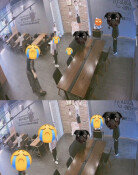Practical Progress at Nuke Summit
A two-day nuclear security summit will be held in Washington today. The first of its kind, the event will bring together 47 heads of state and government leaders, including from the five nuclear powers - U.S., Russia, Britain, France and China. The leaders will mainly discuss measures to prevent nuclear terrorism, which has emerged as a real threat since the 9/11 terrorist attacks. Nuclear security, which seeks to block nuclear weapons and materials from falling into the hands of terrorists, will top the agenda.
The leaders will come up with action plans to be implemented by individual countries and devise measures to enhance global cooperation. Washington aims to establish a framework to safely control nuclear materials possessed by individual countries within four years. If nuclear states takes the lead and non-nuclear countries join the effort, safe management of nuclear materials is possible. Shortly before the summit, Chile set a good precedent by handing over 18 kilograms of highly-enriched uranium, a material for nuclear weapons development, to the U.S.
Though the Nuclear Security Summit is focused on nuclear security, world leaders will also discuss dealing with countries likely to engage in nuclear proliferation. To prevent criminal organizations from getting their hands on nuclear weapons, rogue countries should be thoroughly banned from transferring nuclear weapons and technology to such organizations. Not invited to the nuclear summit were North Korea, Iran and Syria. Washington said countries willing to join the international effort to enhance the safety of nuclear weapons and technology were invited. If the three countries are neglected, however, global nuclear security is impossible.
Pyongyang said Friday, We will expand and modernize our nuclear arsenal as much as we need. This is its rebuke to the newly released U.S. Nuclear Posture Review, which subjects North Korea and Iran to U.S. nuclear attacks, and a challenge to the summit. U.S. Secretary of State Hillary Clinton said the same day, I understand that North Korea has one to six nuclear weapons. The U.S. does not officially recognize North Korea as a nuclear state so the mention of the number of North Koreas nuclear weapons is a warning to Pyongyang.
South Korean President Lee Myung-bak, who will attend the summit, should build a consensus on the importance of global cooperation in resolving North Koreas nuclear program. The urgent issue for South Korea is to curb North Koreas nuclear weapons development. The Nuclear Security Summit should present practical measures to deal with countries such as North Korea that threaten world peace with nuclear weapons, along with measures to block terrorist groups from getting nuclear weapons.







